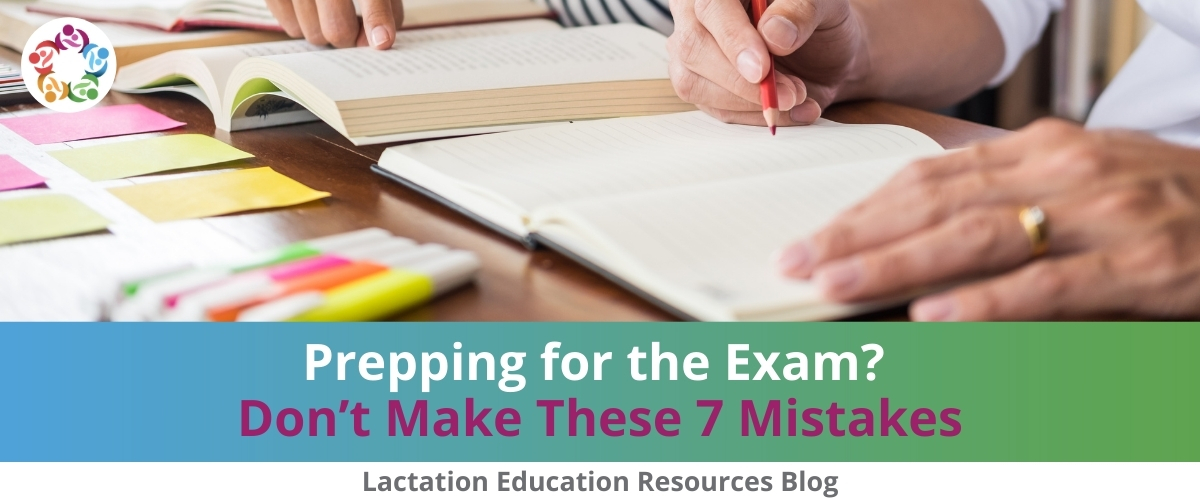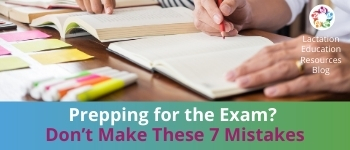Prepping for the Exam? Don’t Make These 7 Mistakes

If you’re studying for the IBCLC exam, you’ve probably gotten a lot of advice on what to do.
Here, we’re going to tell you seven things not to do.
In this blog series, Goals For 2021, we’re talking with Angela Love-Zaranka, BA, IBCLC, RLC, Program Director at Lactation Education Resources (LER). Love-Zaranka served on the IBLCE Board from 2006 to 2012 and sat on IBLCE committees until 2015.
So far, we’ve covered creating a big-picture plan, getting your health sciences courses, options for obtaining the required 95 hours of lactation-specific education, and ways to get your clinical hours.
Next, if your goals for 2021 include studying for the exam, let’s talk about what not to.
Don’t ignore the Detailed Content Outline.
The body that writes the exam (IBLCE) uses a very specific document when they create questions and plan content. Getting familiar with this document, the Detailed Content Outline is one of the first and most powerful steps you can take when you prepare to study.
“The best thing to do when you’re ready to start studying is to grab your Detailed Content Outline,” Love-Zaranka says.
Don’t forget that you have strong areas.
The IBCLC exam covers a wide array of areas, spanning stages of growth and development from pregnancy through toddlerhood, encompassing anatomy and physiology to psychology and listening skills.
It’s easy for it to seem overwhelming.
But remember, it’s very likely that there are several of these content areas where your knowledge base is already strong.
This knowledge may have come from your own experience as a lactating parent, from especially detailed cases you saw during your clinical hours, or from your employment.
Regardless of the source, chances are, you already know more than you think.
Identifying your own strong areas will help you also locate the areas where you need to study harder.
“Ask yourself what you’ve already learned,” Love-Zaranka advises. “Then ask, ‘Where are my holes?’ And then find ways to study those things specifically.”
If it’s been 30 years since you’ve taken A&P, go brush up on A&P. If you love the composition of human milk, then you don’t have to study that. But if you’ve never seen a child nurse over the age of two months, then you need to go try to find ways to learn and get experience in that.
Don’t worry about brand-new research.
As exam time draws near, Love-Zaranka often fields questions from students who are concerned that the latest research study they read about has rendered something they studied obsolete. Because new data is always coming to light, they worry that they will miss questions on the exam because the information in their current courses has been proven wrong.
Don’t worry, Love-Zaranka advises.
You don’t have to study pieces of research that came out that year,” she says, “and the reason is, the exam was written long before you took it.”
Don’t make panic purchases.
Another common trend Love-Zaranka sees as exam time approaches? Candidates shelling out money for more and more practice exam products.
“Be careful about chasing more exam questions,” she says. “Don’t go buy something the week before the exam because someone said it’s a good example of what the IBLCE exam is like. None of it is accurate. The IBLCE itself has a practice exam, but even that doesn’t necessarily mean you’re going to pass the exam if you score well on this test.
“At LER, we have gotten a lot of feedback that ours is relatively close to the IBLCE Exam,” she continues. But there is no one product, not even ours, that can guarantee, ‘If you do well on this, you’re definitely going to pass the exam.’
Her advice? “Don’t waste your money. Don’t chase the next flashy thing you just heard about. Just stay focused.”
Don’t spend over-focus on low-yield areas.
The Detailed Content Outline lets you know how many questions on the exam will come from each subject area. If there is an area you don’t know much about, but that contributes only a small number of questions, Love-Zaranka recommends against spending too much time on it.
“Take a look at the number of items that can be in each section,” she advises. “So for example, let’s say there’s a section where there are only seven questions out of 175 that can possibly be on the exam on that topic, and you don’t know much about that topic. Learn your basic overview, but don’t completely stress about that topic.”
Don’t leave studying to chance.
Once you know your exam date, don’t settle for a vague idea about when you’ll study.
Figure out exactly how much time you have until the exam, plan when you’ll work each week, and then schedule which topics you’ll cover on each of your study days.
Love-Zaranka recommends starting to study 90 days before the exam if possible, and planning each week’s work, taking into consideration other commitments for the week. “Put it on your calendar in detail,” she says. “Decide, ‘One day I’m going to do this, and one day I’m going to do that, and this day I’m going to give myself a break because I have to work 12-hour shifts.’
“Put it on your calendar first,” she adds. “Otherwise, it isn’t going to happen.”
Don’t Panic.
One last “don’t?” Don’t let your nerves get the best of you.
“Remember, it’s an entry-level exam,” Love-Zaranka says. “It’s 175 multiple-choice questions. Over 80 percent of people pass the first time.”
Looking for the LER course mentioned? You can find it here.

If you’re studying for the IBCLC exam, you’ve probably gotten a lot of advice on what to do.
Here, we’re going to tell you seven things not to do.
In this blog series, Goals For 2021, we’re talking with Angela Love-Zaranka, BA, IBCLC, RLC, Program Director at Lactation Education Resources (LER). Love-Zaranka served on the IBLCE Board from 2006 to 2012 and sat on IBLCE committees until 2015.
So far, we’ve covered creating a big-picture plan, getting your health sciences courses, options for obtaining the required 95 hours of lactation-specific education, and ways to get your clinical hours.
Next, if your goals for 2021 include studying for the exam, let’s talk about what not to.
Don’t ignore the Detailed Content Outline.
The body that writes the exam (IBLCE) uses a very specific document when they create questions and plan content. Getting familiar with this document, the Detailed Content Outline is one of the first and most powerful steps you can take when you prepare to study.
“The best thing to do when you’re ready to start studying is to grab your Detailed Content Outline,” Love-Zaranka says.
Don’t forget that you have strong areas.
The IBCLC exam covers a wide array of areas, spanning stages of growth and development from pregnancy through toddlerhood, encompassing anatomy and physiology to psychology and listening skills.
It’s easy for it to seem overwhelming.
But remember, it’s very likely that there are several of these content areas where your knowledge base is already strong.
This knowledge may have come from your own experience as a lactating parent, from especially detailed cases you saw during your clinical hours, or from your employment.
Regardless of the source, chances are, you already know more than you think.
Identifying your own strong areas will help you also locate the areas where you need to study harder.
“Ask yourself what you’ve already learned,” Love-Zaranka advises. “Then ask, ‘Where are my holes?’ And then find ways to study those things specifically.”
If it’s been 30 years since you’ve taken A&P, go brush up on A&P. If you love composition of human milk, then you don’t have to study that. But if you’ve never seen a child nurse over the age of two months, then you need to go try to find ways to learn and get experience in that.
Don’t worry about brand-new research.
As exam time draws near, Love-Zaranka often fields questions from students who are concerned that the latest research study they read about has rendered something they studied obsolete. Because new data is always coming to light, they worry that they will miss questions on the exam because the information in their current courses has been proven wrong.
Don’t worry, Love-Zaranka advises.
You don’t have to study pieces of research that came out that year,” she says, “and the reason is, the exam was written long before you took it.”
Don’t make panic purchases.
Another common trend Love-Zaranka sees as exam time approaches? Candidates shelling out money for more and more practice exam products.
“Be careful about chasing more exam questions,” she says. “Don’t go buy something the week before the exam because someone said it’s a good example of what the IBLCE exam is like. None of it is accurate. The IBLCE itself has a practice exam, but even that doesn’t necessarily mean you’re going to pass the exam if you score well on this test.
“At LER, we have gotten a lot of feedback that ours is relatively close to the IBLCE Exam,” she continues. But there is no one product, not even ours, that can guarantee, ‘If you do well on this, you’re definitely going to pass the exam.’
Her advice? “Don’t waste your money. Don’t chase the next flashy thing you just heard about. Just stay focused.”
Don’t spend over-focus on low-yield areas.
The Detailed Content Outline lets you know how many questions on the exam will come from each subject area. If there is an area you don’t know much about, but that contributes only a small number of questions, Love-Zaranka recommends against spending too much time on it.
“Take a look at the number of items that can be in each section,” she advises. “So for example, let’s say there’s a section where there are only seven questions out of 175 that can possibly be on the exam on that topic, and you don’t know much about that topic. Learn your basic overview, but don’t completely stress about that topic.”
Don’t leave studying to chance.
Once you know your exam date, don’t settle for a vague idea about when you’ll study.
Figure out exactly how much time you have until the exam, plan when you’ll work each week, and then schedule which topics you’ll cover on each of your study days.
Love-Zaranka recommends starting to study 90 days before the exam if possible, and planning each week’s work, taking into consideration other commitments for the week. “Put it on your calendar in detail,” she says. “Decide, ‘One day I’m going to do this, and one day I’m going to do that, and this day I’m going to give myself a break because I have to work 12-hour shifts.’
“Put it on your calendar first,” she adds. “Otherwise, it isn’t going to happen.”
Don’t Panic.
One last “don’t?” Don’t let your nerves get the best of you.
“Remember, it’s an entry-level exam,” Love-Zaranka says. “It’s 175 multiple-choice questions. Over 80 percent of people pass the first time.”
Looking for the LER Exam Review course mentioned? You can find it here.
By accepting you will be accessing a service provided by a third-party external to https://www.lactationtraining.com/
